Tuesday Feb 17, 2026
Tuesday Feb 17, 2026
Monday, 12 August 2024 00:00 - - {{hitsCtrl.values.hits}}
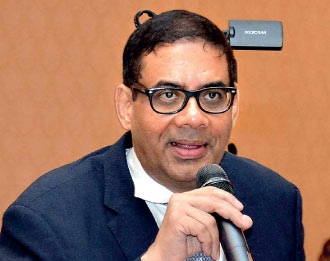
Human Capital Summit 2024 Chairman Dinesh Weerakkody
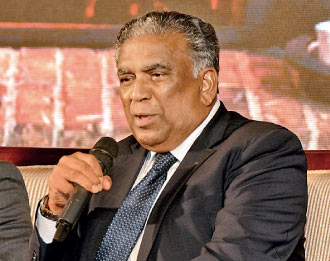
H R Cornucopia MD Ahmedali N
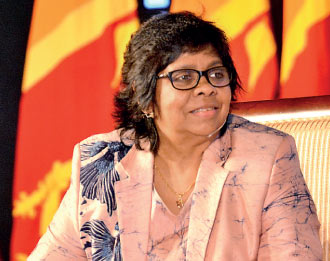
CIMA Global President 2022-23 Melanie J Kanaka
The Leadership Panel of the Human Capital Summit 2024, referred to as the ‘Fireside Chat’, provided a unique platform to discuss the future of human capital management and the evolving landscape of leadership.
In a series of insightful exchanges, the panellists addressed pressing issues such as the integration of innovative technologies, strategic workforce planning, and the role of leadership in navigating global challenges. The discussions highlighted the collective wisdom and forward-thinking strategies essential for building resilient, future-ready institutions.
Moderated by CIMA Global 2022/23 President Melanie J. Kanaka, and Sri Lanka Human Capital Summit 2024 Chairman Dinesh Weerakkody, the panel featured distinguished speakers including 30th Prime Minister of Australia Scott Morrison, former Maldivian President Mohamed Nasheed, and other eminent figures from the realms of government, business, and academia. Following are excerpts:
By Michelle Therese Alles
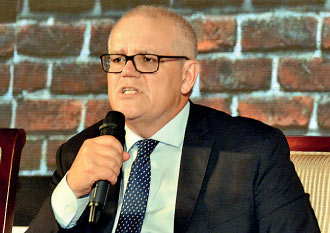 |
|
- Former Prime Minister of Australia Scott Morrison - |
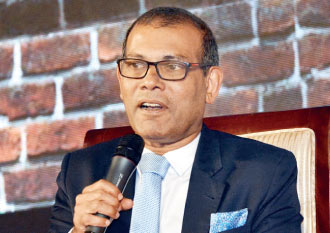 |
|
- Former President of the Maldives Mohamed Nasheed - |
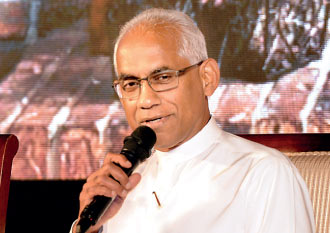 |
|
- Member of Parliament Eran Wickramaratne - |
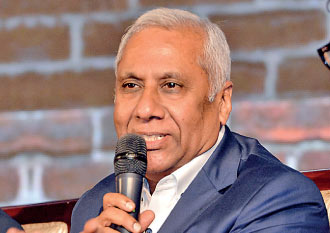 |
|
- Invest India former MD and CEO Deepak Bagla - |
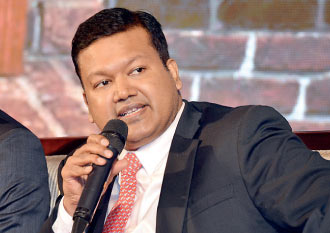 |
|
- Deloitte South Asia Chief Executive Officer Romal Shetty - |
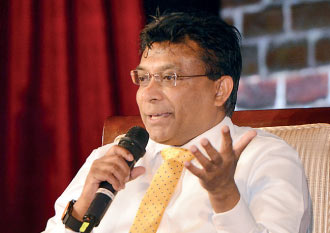 |
|
- Alliance for AI & Humanity President Dr. Anton Ravindran - |
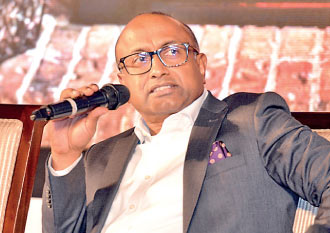 |
|
- NASSCOM Chairman Rajesh Nambiar - |
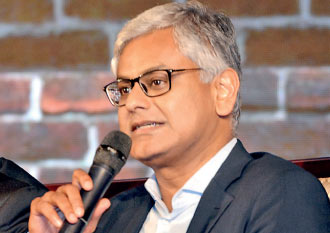 |
|
- John Keells Holdings Chairman Krishan Balendra - |
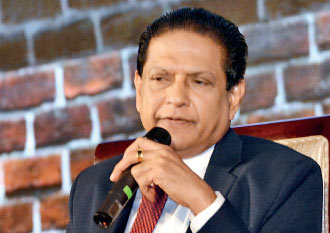 |
|
- Secretary to the Prime Minister Anura Dissanayake - |
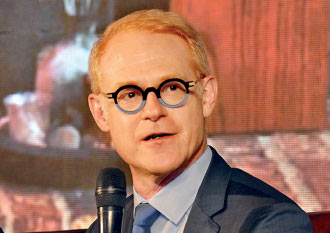 |
|
- Ansell CEO Neil Salmon - |
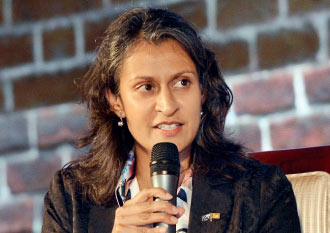 |
|
- Australian Deputy High Commissioner to Sri Lanka and Maldives Lalita Kapur - |
Dinesh Weerakkody: Mr Morrison, to start the panel, how can Sri Lanka effectively manage its relations with both China and India while navigating its current financial crisis?
Scott Morrison: In line with national interests, transparency, and open communication are crucial. Australia frequently encounters this question in its relations with the Pacific and ASEAN. During my tenure as Prime Minister, and likely continuing under the current Labour government, we expected countries to pursue their national interests similarly to how we do. Australia and Sri Lanka, as representative democracies with shared views on the rules-based international order, are aligned in their perspectives on protecting sovereignty and resisting hegemonic influences. As long as Sri Lanka remains transparent and clear about its arrangements and motivations, it will foster positive relations with like-minded allies.
Dinesh Weerakkody: Mr Nasheed, as our neighbour, could you share your perspective on this matter?
Mohamed Nasheed: Foreign policy, in my view, revolves around identifying and nurturing genuine friendships rather than pitting one ally against another. It’s about building and maintaining strong, trustworthy relationships. This approach isn’t about non-alignment but rather about recognising your key partners and strengthening those ties. Effective foreign policy requires clear choices regarding alliances, often influenced by geographical factors.
Dinesh Weerakkody: Eran, can you share your thoughts?
Eran Wickramaratne: I agree with Hon. Scott Morrison’s perspective on foreign policy. The primary focus should always be on advancing our national interests. Historically, our approach during the 60s, 70s, and 80s was rooted in non-alignment. However, given the evolving global landscape, a multi-aligned policy is now more suitable. We must recognise that India, as our closest neighbour, has valid security concerns that any Sri Lankan government will respect. At the same time, we are open to investments from any source, provided they align with our national interests.
Dinesh Weerakkody: The next question is directed towards our Indian colleagues: What steps can be taken to make Sri Lanka more appealing for Indian investments? Deepak, could you start us off?
Deepak Bagla: Dinesh, thank you for organising this discussion. It’s important to note that capital generally flows to regions where it is welcomed and can achieve a favourable return. Proximity often provides notable advantages in this regard. From my viewpoint, there are numerous complementary factors to consider. As long as capital is valued and respected, we can anticipate a substantial increase in investment.
Romal Shetty: One key strength of India lies in its service sector, which presents a notable opportunity for collaboration with Sri Lanka. Sri Lankans living abroad also exhibit a high level of service excellence, highlighting a strong synergy between the two nations in this field. By combining our strengths, India and Sri Lanka have the potential to redefine our global roles—not merely as manufacturing hubs, but as leaders in service excellence. Leveraging these complementary capabilities, the two countries can collectively provide outstanding service solutions to the international market.
Rajesh Nambiar: When it comes to attracting Indian investments, businesses are drawn to compelling opportunities. Sri Lanka presents a strong case for Indian investment, but it must be showcased effectively. At present, there appears to be a cautious approach rather than a decisive push forward. In India, states actively compete for investments, a level of proactive engagement that Sri Lanka has yet to match. By clearly outlining specific advantages and actionable steps, Sri Lanka can create a more attractive and competitive environment for Indian investors.
Dinesh Weerakkody: Discussions with the President have highlighted the ongoing issue of brain drain. One proposed solution is to concentrate on upskilling our workforce to access better opportunities in the Middle East, potentially boosting their earnings from $ 100 to $ 500. What is your perspective on this approach, Krishan?
Krishan Balendra: The issue of brain drain has indeed become prominent, particularly over the past two years amid the economic crisis, leading to a significant exodus of talent. However, recent trends indicate that some of these individuals are beginning to return. Despite challenges such as civil wars, economic crises, and the pandemic over the past 30 years, the private sector has generally managed to grow and adapt. Initially, the talent exodus raised concerns, but there was confidence in our ability to retain and attract talent. Moving forward, it is essential to focus on key strategies to enhance talent retention. Drawing from the lessons of the past three decades, I am confident that the brain drain will be effectively addressed and more professionals will return to contribute to the country’s growth.
Dinesh Weerakkody: Neil, with your significant investments in Sri Lanka, could you share your thoughts on this issue?
Neil Salmon: As the world’s leading supplier of hand and body protection, Ansell regards Sri Lanka as our largest manufacturing hub, employing over 6,000 people and making us one of the largest multinational employers in the country. The availability of skilled talent is vital to our operations. While the migration of highly skilled leaders, technicians, and scientists has impacted us, I view this talent not as permanently lost but as temporarily on loan. These individuals are gaining valuable international experience that could benefit Sri Lanka in the future. Our goal should be to welcome this talent back to Sri Lanka, enriched by their global experience. Simultaneously, we must enhance local conditions to make remaining in Sri Lanka more attractive. Addressing this issue is essential for our continued success and growth.
Dinesh Weerakkody: Ahmed, with your extensive experience as a regional head for Glaxo and insights from your recent visit to Sri Lanka, what strategies do you recommend for enhancing our local capacity?
Ahmedali N: The migration of around 300,000 individuals from Sri Lanka is alarming. Reflecting on India’s approach, the country has expanded its number of top institutions from two IIMs and four IITs to 21 IIMs and 24 IITs, enhancing its ability to retain talent. India’s success also comes from competitive salaries and effective HR practices, such as regular CEO open houses. Adopting similar strategies and strengthening local capacity could help Sri Lanka retain and attract skilled professionals.
Dinesh Weerakkody: Hon. Morrison, Mr Anura Dissanayake, and Mr Deepak Bagla, what are your views on enhancing public sector service delivery?
Scott Morrison: Enhancing public sector service delivery is crucial. Australia’s Overseas Development Assistance (ODA) program has notably succeeded by focusing on strengthening public sector capabilities, particularly in finance and treasury. The goal is to develop a supportive public sector that facilitates private sector growth rather than dictating it. For Sri Lanka, this approach necessitates a fundamental shift in mindset to create a government that effectively supports and enables private sector development.
Anura Dissanayake: Since the 2021 crisis, substantial investments and reforms have been implemented to modernise the public sector. Efforts have concentrated on improving digital infrastructure to boost transparency and customer service. Significant investments have been made in digital systems for income tax, customs, and subsidy transfers. The introduction of unique IDs is expected to drive further reforms, and within the next three years, public sector services are anticipated to meet the expectations of both the private sector and the public.
Deepak Bagla: In line with Hon. Morrison’s emphasis on accountability, digitisation stands out as a crucial tool for enhancing transparency. For instance, one Indian state government has adopted a system that allows the Chief Minister to track file movements in real-time. If a file remains with an official for over 48 hours, an alert is triggered. This approach helps identify whether delays are due to individual actions or systemic issues, enabling more precise and effective improvements.
Dinesh Weerakkody: Before I pass the discussion to my colleague Melanie, I have a crucial question for Lalita. There is growing concern among Sri Lankan business people that our ambassadors tend to prioritise political diplomacy over economic diplomacy. How does Australia address this issue, and what strategies are employed to ensure that economic diplomacy receives the necessary focus and effectiveness?
Lalita Kapur: To effectively promote a country, showcasing a stable and open economy alongside successful domestic and international companies is key. These success stories act as strong endorsements for attracting investment. Although diplomats often face resource constraints, many in Sri Lanka’s Foreign Service prioritise economic diplomacy, understanding its crucial role in attracting investment. As Sri Lanka stabilises, its attractiveness as an investment destination is expected to increase.
Melanie J. Kanaka: Today, we highlighted the critical role of human capital in a country’s success. To industry leaders, the question is: how can we develop a sustainable talent pipeline in key sectors such as Technology, Tourism, Financial Services, the Public Sector, and Start-ups? I invite Mr Krishan Balendra, Mr Romal Shetty, Mr Deepak Bagla, and Dr. Anton Ravindran to share their insights on this topic.
Krishan Balendra: Building a robust talent pipeline extends beyond formal education. While academic credentials are important, the real asset lies in practical, on-the-job training. Gaining experience from seasoned professionals in advanced environments offers invaluable hands-on knowledge that often surpasses traditional executive courses. This practical experience is essential for developing talent and preparing individuals for future roles.
Romal Shetty: Developing a talent pipeline involves addressing skills across the spectrum—from fundamental livelihood skills to advanced research and development. In Sri Lanka, supporting innovation is essential for retaining talent. Corporations should invest early in academia, incorporating technology and ensuring that students gain practical skills relevant to the job market. Bridging the gap between education and industry requirements will strengthen our talent development initiatives.
Deepak Bagla: To develop a robust talent pipeline, empowerment and inclusion are crucial. In India, we’ve utilised digital platforms to ensure broad participation in our processes, a necessity in today’s dynamic environment. The traditional education system requires significant reform, moving towards shorter, work-based training that equips individuals for an unpredictable future. This approach focuses on preparing people for uncertainties rather than fixed outcomes, which is essential for cultivating adaptable and relevant human capital.
Dr. Anton Ravindran: With the World Economic Forum forecasting that AI will replace 85 million jobs by 2025 and 300 million by 2030, addressing the skills gap is crucial. To adapt, we must move away from traditional education models towards more flexible, tech-driven solutions. AI can tailor training to individual learning speeds and styles, making microcredentials vital for ongoing education. Countries should support this shift by adopting private sector training programs and offering grants or subsidies. Singapore’s SkillsFuture program, which funds a broad range of learning opportunities from tech skills to personal development, serves as a notable example of this approach.
Melanie J. Kanaka: Minister Eran, Secretary to the Prime Minister, Mr Morrison, and Mr Nasheed, could you share your views on developing a talent pipeline? From a broader perspective, what strategies do you believe will be most effective in advancing this initiative?
Eran Wickramaratne: Sri Lanka has focused heavily on hard infrastructure over the past two decades. Now, it’s crucial to shift to developing soft infrastructure and human resources. Our education system needs a major overhaul, moving beyond reforms to include private and non-profit sectors to keep up globally. Embracing brain drain as a chance to attract returning professionals, and adjusting immigration policies to recognise their value, can help transform brain drain into ‘brain rain’. Continuous training for both public and private sectors is essential. Investing in employee development, as seen in international banking, is key to building a competitive, globally relevant workforce.
Anura Dissanayake: Sri Lanka has seen a rise in human mobility, with 450,000 people moving in and out annually. Despite this, we release 275,000 to 285,000 new talents into the job market each year, indicating we can manage these changes. To address this, we’re overhauling our education system with $1 billion in investment over the next five years, supported by the World Bank and ADB. Reforms are being piloted in 150 secondary schools and will extend to primary education next year. We’re also developing a ten-year human resource plan in collaboration with industry chambers and SLASSCOM to create a more skilled and adaptable workforce.
Scott Morrison: Australia’s success with Tasmania and South Australia underlines the impact of effective economic planning. Tasmania reversed high emigration with a strong economic strategy, while South Australia sustained its economic gains despite political changes. Sri Lanka can learn from this by offering a clear, positive vision for the future and ensuring consistent economic reforms. Moreover, Australia’s experience highlights the value of vocational education. By promoting trade skills and aligning education with job market needs, Sri Lanka can better prepare young people for successful careers.
Mohamed Nasheed: Obstructing human mobility is not the answer. Many seek better opportunities abroad, and Sri Lanka has greatly benefited from remittances, which totalled $ 7 billion in 2020—more than the entire Maldivian economy. These remittances often stabilise the economy during downturns and conflicts. Sri Lanka’s rich educational history, including establishing its first university in 1921 and launching a tourism management faculty in 1964, has set a precedent for many countries, including the Maldives. The challenge lies not in the numbers but in aligning education with national needs. The shift away from English-medium education and the nationalisation of private schools have had lasting impacts. A fundamental overhaul of the education system is needed to prepare a workforce for the global market, leveraging Sri Lanka’s high literacy rate and expatriate skills. The focus should be on the relevance and quality of education, not just its quantity.
Melanie J. Kanaka: As we face rapid changes and increasing demands for upskilling and reskilling, how can we enhance capabilities in education and higher education? I’d like to hear the panel’s thoughts in order, with brief responses.
Krishan Balendra: To enhance capabilities, we should invite experts with advanced experience from more developed environments. Their real-world insights and practices are crucial for improving our own systems.
Romal Shetty: Building capability hinges on more than just great ideas; it requires effective execution. Turning ideas into action is essential for making real progress.
Neil Salmon: I agree. Sri Lanka should prioritise projects and technologies that attract talent and build on existing strengths. By setting clear goals and leveraging industries such as textiles and manufacturing, the country can support innovation and draw skilled individuals.
Ahmedali N: India’s ITI model, which pairs vocational training with industry apprenticeships, offers valuable insights. With government support, industries can engage apprentices for up to three years without guaranteed jobs, providing hands-on experience while addressing workforce needs. India’s move towards digital transactions, like QR codes, further highlights how effective industry-government partnerships can drive progress. This model could yield significant benefits if applied elsewhere.
Rajesh Nambiar: As technology advances rapidly, traditional training methods may quickly become obsolete. Instead of focusing solely on current skills, we should prioritise learnability and adaptability. A tripartite model involving government, academia, and industry can address this. Industry understands emerging trends, academia offers foundational knowledge, and government supports and facilitates collaboration. This partnership will enable the workforce to adapt and reskill effectively, enhancing our ability to meet future challenges.
Eran Wickramaratne: Hon. Scott Morrison’s remarks on the value of both university and vocational education highlight a cultural barrier to embracing technical training. Reflecting on my own experience, while I pursued a university degree, my brother’s vocational training led to greater financial success. This underscores the need to expand and value vocational education. Successful international models, where public sector professionals are included in top business schools, show the benefits of such exposure. Implementing similar strategies and expanding vocational training in Sri Lanka will be crucial for preparing our workforce for future challenges.
Scott Morrison: To better support Sri Lanka’s economic goals, development agencies must align their efforts with the country’s specific priorities. Often spread too thin, these organisations should focus on key areas like vocational education and training, ensuring accessibility and international standards. Coordinating and concentrating resources will significantly improve their impact.
Mohamed Nasheed: To achieve meaningful progress, Sri Lanka must adopt a holistic approach rather than targeting isolated goals. Just as raising a boat requires raising the tide, improving school enrolment and ensuring high-quality education are fundamental. Education should be viewed as a basic human right, with compulsory schooling enforced up to age 16. While national pride and local culture are important, it is crucial to equip students with international skills to succeed in a globalised world. Education must go beyond vocational and technical training to include comprehensive learning that prepares students for global challenges.
Anura Dissanayake: As a public sector representative, I am optimistic about the upcoming reforms and digital infrastructure enhancements. These initiatives are essential for supporting a thriving environment across various sectors. By prioritising advancements in education and skills development, we are establishing a robust foundation that will enhance the growth and efficiency of all sectors in the future.
Lalita Kapur: Based on my experience in the Australian public service, motivation is crucial for public sector effectiveness. Public servants must view their roles as serving the public and providing impactful policy advice. Sri Lanka needs to rethink its approach to politics and policy formation to improve outcomes. While the country has skilled public servants, the current system often limits their potential. Focusing on meaningful work and quality advice will enhance public sector performance.
Dr. Anton Ravindran: To stay ahead, we must embrace technology and lifelong learning across all sectors. As skills quickly become obsolete, preparing for new roles, like data scientists and gig economy positions, is crucial. We need to anticipate future skills, emphasise creativity and innovation, and build strong public-private partnerships to navigate this evolving landscape effectively.
Audience member: To address human capital, we must build a supportive environment that attracts and retains talent. Rather than just focusing on brain drain, our goal should be to develop our human capital to both support local industries and contribute globally. As Hon. Eran suggested, creating a ‘brain rain’—encouraging skilled individuals to return with valuable experience—should be our aim. India’s successful approach offers valuable lessons. Insights from Deepak, Romal, and Rajesh on adapting India’s strategies for Sri Lanka will be crucial.
Deepak Bagla: When Prime Minister Modi assumed office, his vision was to shift India from a nation of job seekers to one of job creators. This goal has fuelled significant growth in India’s start-up ecosystem, now ranked among the top three globally. Over the past 3,000 days, India has seen the emergence of 65 million MSMEs and 333 million self-employed individuals. This emphasis on cultivating a job-creating mindset, supported by government policies and various stakeholders, is driving transformative change in the country.
Romal Shetty: Leveraging human capital involves various factors. Not everyone needs to return from abroad, but bringing back new knowledge is beneficial. India focused on its service sector and expanded educational access beyond top institutions like IITs and IIMs. Sri Lanka should similarly invest in its niche areas and broaden educational opportunities.
Rajesh Nambiar: For businesses to thrive, three key factors must align: expertise, economics, and environment. Expertise should be well-developed within the workforce, while the economic model must be sustainable and not overly reliant on subsidies. Additionally, creating a supportive environment is crucial. India, which once faced significant brain drain, saw many skilled professionals return once favourable conditions were established. Sri Lanka can similarly benefit by focusing on these elements to support a robust business climate.
Melanie J. Kanaka: With female labour force participation currently at 32%, what strategies could effectively increase this number to achieve a more balanced 50/50 ratio?
Lalita Kapur: Sri Lanka’s female labour force participation stands at just 32%, despite high education levels. Many qualified women face significant challenges that hinder their ability to remain in the workforce. To address this, Sri Lanka must tackle legislative barriers, improve access to quality childcare, and shift cultural expectations that unfairly burden women with family care. Progress is being made, but the involvement of both women and men is crucial. For example, in Australia, male allies who take on caregiving roles have supported their partners’ careers, leading to positive change. Adopting a similar approach could help Sri Lanka unlock the full potential of its female workforce and drive economic growth.
Audience member: To the Hon. Morrison and experts in public sector transformation: Given the rapid obsolescence of skills and the growing need for agility, how is your government encouraging public servants to develop and embrace new skills? Many civil servants find current systems insufficiently supportive of risk-taking, innovation, and experimentation. What measures have been implemented to support a culture where these qualities are actively encouraged and rewarded, especially in an era marked by constant change?
Scott Morrison: In my past roles, including Prime Minister, I found that clear policy direction and ambitious goals were key to maximising public servant effectiveness. Engaging them directly in implementation and valuing their expertise turned them into active participants rather than passive observers. Effective policymaking involves collaboration, setting clear objectives, and appreciating their contributions, as demonstrated in Australia.
Conclusion
The panel emphasised the importance of adapting educational systems, enhancing vocational training, and supporting international collaborations to build a resilient and future-ready workforce. They called for a comprehensive approach to talent development and public sector reform to support sustainable growth.
Pix by Upul Abayasekara